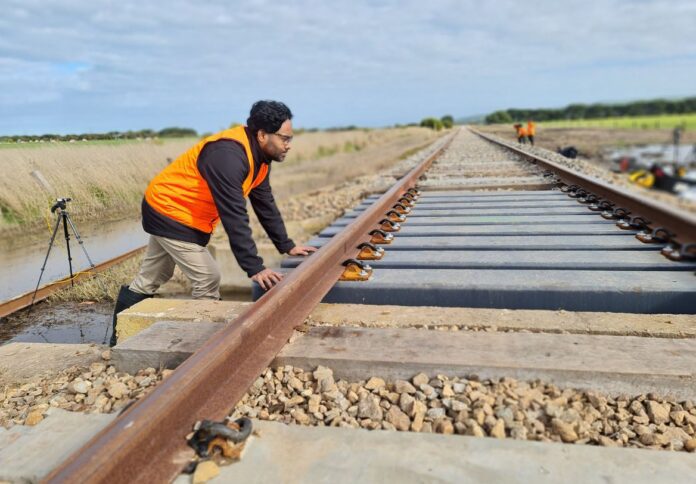
A team of researchers from the University of Southern Queensland has begun installing the first sustainable composite railway transoms in Adelaide as part of a collaborative project between UniSQ and Austrak.
The UniSQ team, led by Chief Investigator Dr Wahid Ferdous, will replace timber transoms, a type of railway sleeper used in bridges, with a new material made from fibre composite and water-based materials.
The team found that combining these materials can produce a composite transom with a design life of around 50 years.
“This is more than three times longer than existing timber transoms, which last around 15 years, which means we can help significantly reduce track maintenance costs,” Ferdous said.
“The knowledge and experience shared between the University and project partner Austrak has played an important role in validating these new composite transoms.”
The project received backing from the Queensland State Government and Austrak through an Advance Queensland Industry Research Fellowship in 2021.
In July, Ferdous and his team travelled to South Australia to monitor nine composite transoms installed in a part of the state’s rail track under real-life loading conditions, which they then compared to the existing timber transoms.
“We found that the deflection of the rail track with the composite transoms was within the allowable track deflection limit,” Dr Ferdous said.
“I have conducted many tests on these composite transoms at the University’s laboratory, where I had the chance to critically evaluate their performance. But it’s very exciting to see the research in action when it’s translated into a commercial product.”
Institute for Advanced Engineering and Space Sciences Acting Executive Director Prof Allan Manalo said, “This in-service performance evaluation will help demonstrate to railway engineers and authorities the durability and high-performance characteristics of polymer composite transoms and encourage the adoption of this new technology as an alternative to expensive and hard-to-secure hardwood timber for bridge transoms.”
The UniSQ team plans to optimise the transoms’ performance and cost to make them a more competitive product that could one day lead the Australian composite transom market.




















